Digging Deep
The Joy of Competition?
I recently had someone reply to my comments on competition under my Digging Deep main page. She noted in so many words, “Why do we compete? Because we experience joy through competition.” Then she said, “But many people I know in leagues and USTA just do not look happy. They are upset, there are petty issues, etc.” Before I respond to that let me make a few prefacing claims: First, most people (if not everyone to some degree1) are competitive and second, competition should be fun among other things (creative, timeless, etc) in its most pure form.
First, In reality most people are competitive to some degree. If you disagree then let me throw out some examples: Parents and kids playing card or board games with grandma and grandpa. Who doesn’t remember “Hey Grandma, you can’t do that.” or “Let’s see, isn’t that five times in a row I have won that game?” How about the good old standby game of folding up some paper to make a triangle-football and having a contest who can “kick” it through the “uprights” by finger flicking it through your friends fingers? How about kids saying “I’ll race you to the end of the driveway” or little kids (or big kids) playing games on the play ground? And you know it is competition when you hear (from little kids and big kids—aka “adults”) “That is not fair, you can’t do that.” or “What do you mean I can’t do that you did it to me.” The sad thing is you can’t tell if it was a kid or adult that said that from my context. But I digress. The point is, to some degree I would say most folks (if not everyone to some degree) is competitive. How about this one, “I got the job!” or how about the high school or college student doing internships, extracurricular activity, and other resume boosting endeavors to do what? Just for the heck of it? No, they did it to get a leg up in the job race, i.e.the competition for a particular job. How about playing a game of horse outside the garage on the basketball hoop? How about people waiting in line for a movie ticket? Why? Because they want to make sure they get one and not someone else ahead of them. That is competition in a sense. Some people may still deny they are competitive in any way or disagree with my claim but I think they would be hard pressed to refute my claim. And even more revealing, for some reason being competitive has developed a negative connotation which would take another entire discussion to explain that (I have ideas why but it may not be politically correct). I will admit however that some flavors of competition are not healthy and I actually do think that true competition, properly understood, in the good sense I discuss below, is part of our humanity and this is in part what Harvey (2014) is referring to in my discussion on my Digging Deep main page. So on to my second claim.
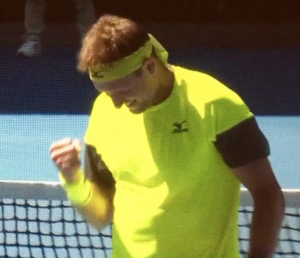
Secondly, Competition should be fun. If you have not seen this match between Chung and Sandgren, both unseeded players in the quarter finals wowing the tennis world at the Australian Open 2018, this is match point against Sandgren (in yellow) who comes to net mid point. What ensues is crazy, the crowd knows it and so do the players. Look at Sandgren’s posture in the video (he looks like he is laughing–he is) and his face in the picture. He is having a blast, pure fun competing at the highest level, the highest stakes and he losing!
Again, competition should be fun. It is the battle ground where you feel like the other person brings the best out in you. Erhmann (2011), known for his angry style of NFL football, but now devotes his life work to equipping other to be transformational coaches, using sports to transform lives, does an excellent job in explaining the heart of competition in what I consider is the best chapter of his book Inside out Coaching (see in resources). The heart of competition, com petere is a mutual quest or striving for excellence (p 213). Competitors can be after the same goal—excellence—but they cannot find it alone. The relationship among opposing coaches and teams (I add fans too as educated by coaches) should be built upon respect for the each other, the game, the rules, and the honor of competition. (p. 216). The root then of competition is to bring out the best along with somebody. And this is why men or women, after battling at the highest level, shake hands and even hug each other. In tennis, it is regularly exhibited by hugs, pats on the shoulder and comments like “He always brings the best out of me…” or “She is such a tough competitor I know I am in for a long battle and that is what this is about.” I cannot count the stories of having my teams that I have coached at my home and playing darts, billiards, and bocci ball. I even have great memories of guys playing the basketball game called horse on my then two-year old son’s mini basket hoop that stood only 5 feet tall and they were shooting from thirty feet away over objects to increase the difficulty: “over the heater, between the chairs and nothing but net.” You could hear the “hootin’ and a-hollerin” at the missed opportunities or amazing shots. Competition is fun. Now some of you may be reluctant to go that far and truthfully when I see players I am coaching blow leads, or not give their best effort, or have a poor attitude it is not “fun” at that moment for sure. But all that is part of the process in teaching them to press on to excellence.
Yet on the whole, when we compete we are playing and that is fun. I am sure most of you have been at a point in your life when we truly play you can go all day, never feel tired and just have fun. We say “wow, having so much fun I lost track of time” or “ Time flies when you are having fun.” This may sound a bit metaphysical but I think Erhmann is on to something here when he says that when we play, truly play, we are fully human “be-ings” free from the self-consciousness that arise as we morph into human “do-ings” measured by our feats, tasks and accomplishments (p. 91). I think this is akin to playing in the zone, or in the moment, etc. We just play loosely and fluidly. We lose track of time, fatigue etc. We just are playing. This can be said of just about any endeavor we love: reading, writing this blog, talking with a friend, etc. Competition is no different.
The joy of competition (in tennis) is not just in the preparation, but in the event, the pressure filled matches and the result. Whether it is winning the Australian Open for Federer or a youth winning an important match for whatever reason there are a range of emotions. Federer, below, said the audience too made him “practice a lot” and “made him nervous.” Clearly the implication is he not only wants to win himself but he wants to do well for them. But look at this range of emotions, all of which are a form of joy!
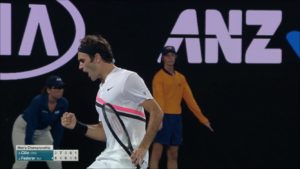
Federer fist pumps after breaking Cilic to go up 5-1 in the 5th set. This is joy expressed with triumph and high level of energy. He is clearly fired up. Great players know how to manage emotions and it is a great feeling to let ‘er rip when we do something great on court. Pure joy.
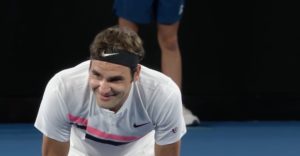
Then after match point and Federer’s arms up in elation, the call was challenged. Fed bent over in a moment of “Are you kidding me, I have to wait to see if this is actually my win.” He clearly has a sense of joy on his face, he is fully enjoying the moment whether it is a nervous smile or not. Basking in the anticipation it is his 20th Grand Slam Championship looming.
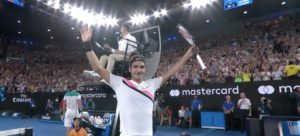
Then when it was official he is ecstatic with joy once again. What a feeling. And after addressing the crowd with appreciation he sits down to soak it in. “What just happened?” “I can’t believe this!” I am sure the emotions are all over the place all centered around being as joyful as a kid in a toy store. And if the Greatest of All time in a sport can feel like that, when he has put in the time, the sacrifice, the energy more than anyone, shouldn’t we all feel this sense of appreciation and joy when we play? Of course we should and do. Fed takes joy in knowing and appreciating the history of tennis, the greats before and appreciates those who compete against him to give him this opportunity to become the great player his is. He embodies the joy and beauty of the sport.
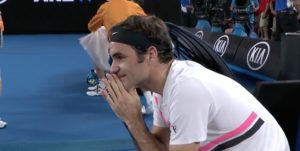
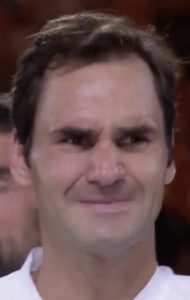 Soaking it in and tears of joy! With some of the tennis greats honoring him, it is no different than if a young player wins an important match after all the hard work and training.
Soaking it in and tears of joy! With some of the tennis greats honoring him, it is no different than if a young player wins an important match after all the hard work and training.
Competition is in itself fun. It is for kids and adults alike. The play itself is the key. Getting lost in the fun, the creativity, the freeness of the sport. In tennis for example, just the sheer joy of being outside and hitting the ball, running all over the court and “grinding” with a friend you enjoy hitting with and not worrying about the score, or how about playing games that really do not matter even though there is a winner and a loser. I do not know about you but I can do that for hours or as long as my body will allow. There really is nothing like hitting new balls, with new strings, on a sunny day outside without a breeze and not caring a whit about the time. Ah, that is fun. Then after an hour or so, playing a set or working on a particular aspect of your game and then your hitting buddy doing the same thing after. That is fun.
Unfortunately, this aspect of competition is far and few between. It is not fostered. It is not modeled enough these days. How often do young people get to play sports creatively, freely and joyously? It is bad enough that kids have to wake up at 5am to get to a tournament fours hours away only to have a poor experience with a poor sport on the other side of the net. How is that fun? We say “play sports” but it is an oxymoron these days in organized sports. That is, they get to play sports, but then their parents are on the sideline yelling at the referee in soccer; parents sitting behind the court and coaching their kid (against the rules) even in a foreign language so no one else knows what they are saying; other kids get away with cheating or having horrible attitudes (like throwing their racquets and falling on the ground in the middle of a match writhing in agony with no parent or umpire putting a stop to it–yes I have seen this). How is that playing fun for the other kid? How selfish and undisciplined by the child to do it and the parent to allow it.
Additionally, things have changed regarding just being a kid. The sheer school work load for some kids is too much. Then compound that with soccer, then dance, then tennis practice all in one day or over two days. Kids are really stretched. I am not saying that kids should not focus on one sport, many do and love it and thrive. I am not saying they cannot do several things. But so many are beginning their young lives with so much pressure to perform at multiple levels it is stressful and anxiety producing at worst and just robbing them of inward self-discovery. Erhmann touches on this when he comments that it use to be that the biographies creative people of the past are full of accounts of long hours they spent sitting by a river as teenagers, thinking their own thoughts, roaming through the woods with their faithful dogs, or dreaming their own dreams. But who today has the leisure and the opportunities for this? If a youngster tries it, as likely as not his parents will fret that he is not using his time constructively, or that she is daydreaming when she should be tackling the serious business of life. However, developing an inner life, including fantasies an daydreams is one fo the most constructive things a growing children can do. The days of most middle-class children are filled with scheduled activities…which leave them hardly any time simply to be themselves. In fact, they are continually distracted from task of self-discovery, force to develop their talents and personalities at those who are in charge of the various activities think best. (Erhmann, p. 92). In short they do not get to play freely or have fun competition.
Is-Ought fallacy or dilemma.
What I described at the start of this article is what competition has been for many years: fun, free, and creative (playing tennis at the park for hours on end, or throwing the baseball with a friend in the front yard and playing imaginary games using the tree and shrubs for bases, etc.). This is the ought. Competition ought to be this way. But what it is these days is not so much many (kids and adults alike) are missing out.
Why this shift, from what ought to be to what is? There are many contributing factors but one sticks out. I grew up playing and formally competing in football, baseball, basketball, swimming, soccer and tennis. From highschool on it was just tennis though as my sport of main competition. That was normal back then. It was also the case for many if not most great athletes and tennis players of the past. Most had a varied experience, playing other sports in addition to or prior to tennis, or whatever their sport of expertise (Wayne Gretzky played baseball passionately). But perhaps this shift of hyper competition and having some of the fun zapped out of it comes from parents and or parent/coaches who never integrated their own sports careers into a coherent narrative. Erhmann touches on this as well. Perhaps parents or coaches are compensating for something perceived as missing; they are chasing something still and see their child as extension of own need for validation (p. 92). I know that sounds deep and “judgey” but I think Erhmann is right in some cases. I call it the weekend warrior syndrome or “pro-wannabe.” It is often the case when a parent only played a sport, if any, in highschool or a lower level in college and seems to be living the glory days over or validating it through their kids. Rarely do elite athletes press their kids on that level. Most of them realize it is difficult to achieve the level they achieved and know it is possible to get there, give their kid some breathing room while at the same time providing the discipline and structure should they rise to that level of commitment. Wayne Bryan’s sons, Mike and Bob (the winningest doubles tandem in history) played everyday because they wanted to, he did not have to coax them. But many other tennis professionals played soccer, basketball, etc. (John Isner flipped a coin to choose tennis over basketball as his path). But Wayne Bryant also provided the structure and discipline for Mike and Bob. I know many ex-professional athletes (baseball, hockey, football, tennis, etc) that coach their own kids and those kids do have pressure inherent in being talented and having talented parents. That is a natural outcome. But those parents also work at finding ways to support their kids efforts and do not need to live out their athletic lives through them. They have been there, done that. So while they may push their kids, knowing the level needed to be excellent, it has a different impetus and source that can provide a lesser stress for the kid. Competition can be fun. The training can be fun. Parents have to work at making sure even in the grind there is fun. And remember the fun is in the process which includes tough times built inherently in the sport. If the kids and adults, playing tennis understand that tennis is a tough sport, the ups and downs are part of the overall challenge, then the fun and joy of the sport is in that context. After all, in tennis, the fun of pursuing excellence in such an amazing sport of tennis requires agility, strength, speed, power, finesse, court sense or tennis IQ, etc. It is a complete sport.
While competition is fun, and I am talking specifically tennis here, competing in tennis can also be brutal and this is the rub. Former collegiate coach and sports psychologist Allen Fox does a first rate job in describing the tough nature of tennis on several fronts I will revisit. Tennis is not only one of the most difficult sports physically (at the higher levels certainly) it is the most punishing sports mentally for numerous reasons.
First, tennis is rough mentally due to the scoring system. Most sports have accumulative scoring which gives you something to work with. In basketball you always have your 56 points for example and can build on it. Soccer you always have your 1 or 2 goals. The same with golf, football, etc. Tennis does not have this. Just today I had a player win a match despite losing more games than the opponent. He won 7-5, 0-6, 10-5 (tiebreak). His opponent won 11 games, my player won 8 (the tiebreak counts as 1 game). But that is not the real difficulty. The difficulty lies in you can win 1 point less than your opponent in every game (in college tennis) and still lose 6-0, 6-0! In other words, you can work for 2-3 hours and have nothing to show for it. You can have long rallies with blistering shots and lose the point. Every game you can have very close games, long rallies, even 4 minute long battles for a game and lose. You have zero. Every set you can have close games, losing by a pint or two and have nothing to show for it losing 6-0. In a match you can have close games and close sets that are simply amazing rallies and lose 6-0, 6-0 and have nothing to show for it. That is brutal. And if you happen to win, it starts all over again in about two hours for your next match and then again, and again, etc. In the matter of a weekend you can have these ups and downs hundreds of times. And the joy of competing in tennis is precisely the sense of conquering this battle rather than it conquering you.
Second tennis is a pressure cooker because you have no clock to save your soul from agonizing like most sports (or a tie score like in soccer to avoid the loss). Soccer, football, basketball, downhill skiing, track and field and other timed events release you from agonizing in physical and mental anguish. A player cannot think, “This will all be over in 1 minute anyway so I can just hang in there.” No, there is not clock and the finish line may be hours a way unless you cave in. There is no buzzer to end your poor play, your stress. And even if you are ahead, there is no time keeper to push the button to give you the victory. You have to hunker down and actually beat the person in what can take another hour or so if you do not put the nail in the coffin now or do what is called the dirty work of closing out a match, a lead. [Free advice: if you have limited time to watch great tennis, e.g. professionals on TV or the internet, watch the last set or the last 4 or so games. That is where the champions shine so see what they do]. Being able to “seal the deal” or close the match out is one of the most joyful things you will experience. Anything worth while has to come at a great price, making it all the sweeter.
Third, competing in tennis is uniquely difficult because it is all you. You can bask in the joy of winning such a difficult battle, but it is only you who grind it out and it is only you to blame when you lose. And rightfully so. Champions take the blame, losers make excuses. But it is still difficult. In many other sports, you have teammates to bail you out if you are stinking up the game. Many sports have substitutions and some have them constantly. Not tennis. You alone have to figure out how to fix the problems and change the momentum. You cannot be pulled out for a while then reinserted when you get your head screwed on straight. You cannot be taken out when you roll an ankle, feel pain in a joint or diving for a ball only to mangle your finger. You cannot be taken out for a few minutes to “fix the booboo.” Tennis coaches call it being naked and exposed. The flip side is, when you play great, win or feel really good about your performance it is an amazing feeling of satisfaction, of a deep sense of joy because you accomplished soemething special.
Fourth tennis can be tough on most people because your sense of self worth, your identity and confidence can take a hit because of precisely the above point, it is just you out there and there is a pecking order in tennis (as is in other sports, the business world etc.). If you lose to someone you think you should beat (and everyone else thinks so too) that can be hard to swallow. But it happens and you have to be thick skinned about it, get back up and work on whatever cost you the match so you win next time. Often in tennis there are numerous levels within our competition: players you will probably not beat, players that really test us and we could beat, players we can beat realistically, and players we should be (and to not beat them is considered a bad loss by the “pecking order committee”). Pressure increases as you compete with the former to the later types. E.g. if you have to play Federer or Halep you will feel no pressure and can play freely, give it your best shot because you, and everyone else in the tennis universe knows you don’t have a shot in the pecking order. Let ‘er rip. But if you play someone that really tests you and you actually could beat them, you might feel some pressure to have that big win but the key is to downplay that pressure and just focus on execution and being aggressive. Remember, if they are supposed to win, though you have a close match, you never know how the “big dog” reacts unless you make it yelp. It may run away or it may attack. You have to find out. Then if you play someone you realistically can and have beaten usually that puts pressure on you if you let it. The circumstances matter if you let them. It could be a fun match you arranged and you are good friends. It could be the finals of a tournament and you think winning that tournament is a must goal; that will put pressure on some but motivate and focus others more. Lastly, if you are playing someone you are supposed to beat (the reverse of the first scenario when you played Federer or Halep) that can put pressure on people.
Parenthetically speaking here is just a brief what to do for each of those situations. It is good to admit whatever state your are in, then dismiss it. It is just a feeling and everyone has them. But spin everything to your advantage. If you are playing Federer or Halep tell yourself “I have nothing to lose and this is a great opportunity to have a great win. Be aggressive and let er rip.” So playing people better than you is an opportunity. If you are playing someone of a similar level or a bit better (the two middle scenarios–you can be them or realistically can–then see it as a chance to trust all that training you have done. I call that “your regular stuff is good enough.” And if you are playing a lesser player, i.e. you are higher in the pecking order, remember to never under respect your opponent and that stuff happens (things go sideways sometimes). So release yourself from that pressure but at the same time realize these are precisely the times you learn how to handle pressure! So any scenario you can spin to make it an opportunity, a lesson on handling pressure, or teaching you to trust your training.
In summary, competition is fun. The fun and joy of competition does not mean it is always a bed of roses or all smiles. But those who thrive in competition realize and enjoy the process which includes agony because it also includes elation, seeing improvement, reaching goals sought after for so long, etc. Nothing worth much comes with little effort. True competitors love the process, it’s ups and downs because they know the endgame is they are better and enjoy the sport better at a higher level. And competition in tennis is the test of getting better at the sport you love while you are having fun or enjoying the process.
Let ‘er Rip
Steve
……
1What I mean by given the opportunity to thrive is I am making a claim that, if universal, should be true of everyone without exception. And it is not the case for some in the world who are just trying to survive, have little to no possessions, etc., and leisurely competition is not even an option. But if those children and people were afforded the opportunity to thrive, to have community and needs met, they would engage in healthy competition by nature that I am talking about.